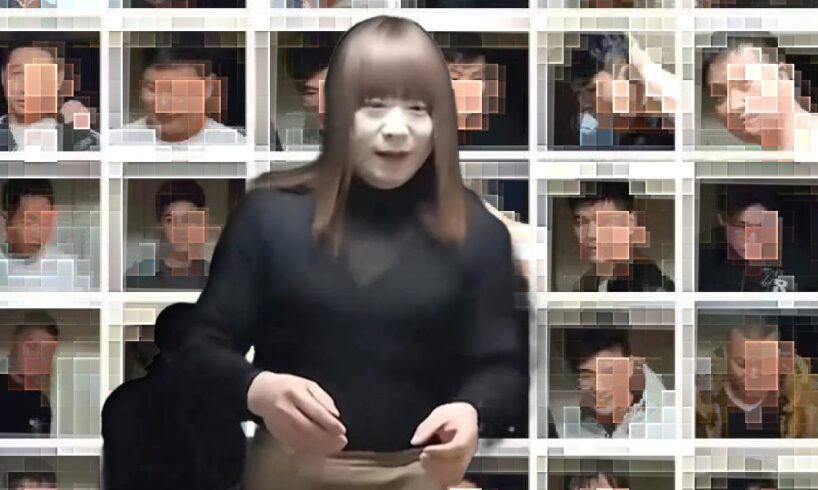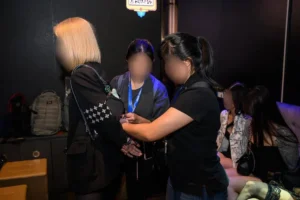
A 60-year-old man from Nanjing became the biggest trending topic on Weibo recently after news circulated that he had cross-dressed as a woman, lured 1,691 men into having sex with him, recorded the encounters, and then spread the videos online. It was suggested that he had exposed the men to HIV and infected at least eleven of them.
That particular story turned out to be inaccurate, but the real story behind the sensationalism was strange enough to pique the interest of countless netizens.
The actual case involves a much younger man: the 38-year-old Mr. Jiao who pretended to be a woman and arranged to hook up with many men, secretly recording the encounters and uploading the footage online.
Mr Jiao and screenshots of some of their videos.
The story first began circulating online in early July. It went viral across multiple Chinese social media platforms after local police arrested the man and publicly announced the case (likely also due to the rapid spread of sensationalized rumors).
This is what the police report of July 8 said:
Police notification
Recently, Jiangning police received reports from members of the public stating that their private videos had been disseminated online by others. Jiangning police immediately launched an investigation and, on July 5, arrested the suspect Jiao (焦) X.
Upon investigation, it was found that Jiao X. (male, 38 years old, person from outside the province) impersonated a woman, arranged to engage in sexual activities with multiple men, and secretly filmed the encounters to disseminate the videos online.
The widely spread online rumor that “a 60-year-old man in Nanjing dressed as a woman and had intimate relations with over a thousand people” is false.
On July 6, Jiao X. was criminally detained by Jiangning police in accordance with the law on suspicion of the crime of disseminating obscene materials. The case is currently under further investigation.
Jiangning Branch of the Nanjing Public Security Bureau
July 8, 2025
By now, the case has come to be known as the “Nanjing Old Guy Hong Incident” (南京红老头事件). In Chinese, “Hong” (红) means “red,” which is not only a color but also carries connotations of celebrity or notoriety in this context.
Jiao initially used the online nickname Ah Hong (阿红). This nickname soon evolved into “Nanjing Sister Hong” (南京红姐), but was later changed by netizens to “Nanjing Old Guy Hong” (南京红老头) after some argued it was inappropriate to refer to Jiao as a woman. Official media posts calling Jiao “Sister” received hundreds of angry reactions, with people demanding an end to the use of the female title.
Jiao had reportedly posed as a woman for a long time, using various social platforms—from WeChat and QQ to Momo—to find men to hook up with.
He wore women’s clothing, a long wig, used heavy white make-up, and also relied on beauty filters and voice-changing tools to appear and sound more feminine to the men he met online.
Since Jiao didn’t charge any money for these encounters, some of the men apparently thought it polite to bring gifts. Leaked footage shows visitors arriving at his apartment with small offerings—from fruit and milk to half-full bottles of cooking oil (how romantic).
Caption: “I’m dying of laughter — someone even brought half a jug of cooking oil from home. There were people bringing milk, fruits, even a pack of tissues — but the funniest thing is someone actually brought half a jug of cooking oil from their own kitchen! Hahaha. Tomorrow morning, when his wife cooks, she’s definitely going to wonder where the oil went.”
Jiao had secretly set up a hidden camera in the rooms to capture the sexual encounters, and later spread these online through online groups where participants had to pay a membership fee of 150 yuan (US$21) per person to join the group.
Some of Jiao’s victims reported him to the police after discovering that videos of their encounters were being circulated online—allegedly after they were recognized by others. By now, several men have been identified by people who know them, and one woman reportedly recognized her own husband in one of the videos.
The exact number of men Jiao met and secretly filmed remains unknown. While authorities have dismissed the viral claim of over 1,600 men as exaggerated — a number reportedly mentioned by Jiao himself — they have not released an official count, and the investigation is still ongoing.
The videos have since spread widely online, showing Jiao engaging in various forms of sexual activity with different male partners, including oral and anal intercourse. While it’s unclear how many of the men initially believed he was a woman, it seems highly likely—if not inevitable—that many realized the truth at some point during the encounters.
Social media discussions around the case now touch on a range of issues, from privacy violations to gender identity and public health concerns.
🏛️ Legal Implications: From Violating Privacy to Endangering Public Health
First, the legal aspects of the case are drawing significant attention, with various lawyers and legal experts weighing in on what crimes Jiao may have committed. For now, he is under criminal detention for disseminating obscene materials—the production, distribution, and sale of sexually explicit content is illegal under Chinese law.
But Jiao also violated the privacy and portrait rights of others by sharing explicit videos that clearly show their faces without consent.
And what if Jiao is indeed HIV-positive and knowingly engaged in unprotected sex? According to Legal Daily (法治日报), he could then be charged with “endangering public safety through dangerous means” (“以危险方法危害公共安全罪”).
This offense carries a sentence of 3 to 10 years in prison if no serious harm occurs, but if it results in severe injury, death, or major damage, it could lead to life imprisonment or even the death penalty.
On the morning of July 8, a local CDC official confirmed that health authorities were now involved in the case. While Jiao’s health status is considered private, officials said they’ll share updates if and when it’s appropriate.
💥 Social Shock: Public Health and “Hole-Sexuals”
There has also been significant social shock over the story. The footage that’s been circulating online shows dozens of different men visiting Jiao — from student types and businessmen to men from all walks of life, including fitness trainers, married men, college athletes, and also young foreign men.
Many netizens expressed that the story changed the way they view the people around them. The men visiting Jiao were not some ‘basket of deplorables’ — they included wealthy older men, young and attractive guys, educated tech professionals. That realization unsettled many, shaking their worldview on multiple levels.
Although this triggered many jokes, it also raised uncomfortable questions not just about how little people may know their friends, neighbors, or even romantic partners—but also about public health. If Jiao did pose an HIV risk, it means these men—many of whom are married or have families—may have unknowingly brought that risk home with them after these unprotected encounters arranged online.
Chinese commentators and bloggers therefore tied the case to women’s sexual health, suggesting that a significant number of gynecological infections among married women are actually caused by their own husbands.
There were multiple online posts suggesting that the entire story reflected the sexual repression experienced by many Chinese men. Jiao, as a man himself, may have understood male psychology well — and was simply giving these men the emotional and physical attention they were lacking at a time when their sexual needs were not being met.
Some argued that such situations are a byproduct of the crackdown on KTV bars and massage parlors, hinting at the shrinking space for illegal prostitution in mainland China.
“Sometimes it really feels like heterosexuality is a joke,” blogger Chen Shishi (@陈折折) wrote: “These men are so filthy, and yet they go back and pretend to be good boyfriends, good husbands, good fathers, good men.”
She added: “As long as there’s a hole, they’re in.”
In doing so, Chen used the term 洞性恋 (dòngxìngliàn), a satirical play on the Chinese word for “homosexual” (同性恋, tóngxìngliàn, literally “same-sex love”).
By replacing the first character 同 (“same”) with 洞 (meaning “hole”), the term becomes “hole-sexual” instead of “homosexual,” mocking those men who sought out Jiao without caring what “she” looked like — or even whether she was secretly a man — as long as there was a “hole” to satisfy them. Recently, 洞性恋 (dòngxìngliàn) has been used a lot by Chinese netizens commenting on this case.
🛑 Politically Sensitive: Controlling the Narrative
Apart from the criminal charges Jiao may face, this story inevitably has some deeper layers that are politically sensitive and are therefore flattened and rewritten into safer territories.
Chinese well-known blogger Lu Shihan (@卢诗翰) recently commented on this issue on Weibo and Zhihu, critiquing how Chinese media and public discourse have framed this story. According to Lu, the narrative was intentionally shifted away from any discussion of a possibly trans, marginalized sex worker.
Lu suggests that censorship, social discomfort, and political sensitivity around class struggles and LGBTQ+ issues force both media and the public to stick to the safest possible framing.
That “safe narrative” is a comical and odd case about a ridiculous old man in a wig, crossdressing for his own fetish pleasure and spreading obscenity, scamming straight men into a sex scandal.
Acknowledging that many of the men may have known — or didn’t care — that “Nanjing Sister Hong” was biologically male would turn the incident into a conversation about queer identity and sexuality. And as Lu points out, that’s a no-go zone.
In his commentary on the issue, Lu Shihan mentions the story of another “Sister Hong” (红姐), an older street sex worker who became well-known in Shenzhen’s Sanhe district and even gained some online fame at a national level.
“Sanhe Sister Hong” came from a mountainous village and ran away as a teenager to work in the city. After being abused and abandoned, she fell into homelessness and eventually turned to sex work to survive in Sanhe, a place known for its lower-class young (post-1990) male day laborers who hop from job to job, self-precariously calling themselves the “great gods of Sanhe” (三和大神). In this environment, Sister Hong stood out not just as a sex worker but also as a vagabond woman, and she has almost reached cult-like status for some—she’s now the legendary Sister Hong.
Sanhe Sister Hong.
“Nanjing Sister Hong” ultimately got that nickname because of the “Sanhe Sister Hong.”
Lu argues that around China, from Nanjing to Shenzhen to Guangdong, there are many “Sister Hongs,” and their vulnerable position, marginalization, and methods of income have to do with much deeper issues about gender and class struggles that go beyond some clueless straight men who just happen to stumble into their bedrooms.
On Chinese Q&A site Zhihu, some commenters are convinced that Jiao’s ‘customers’ were very well aware that he was not a woman — but that it is common to see men dressing up as women for a certain group of closeted men who feel more at ease in ambiguous, feminized encounters that don’t directly confront their own sexual identities. Also, for them, people like Sister Hong feel like safer territory.
🎭 Cultural Fascination: The Story of Shi Peipu
At the heart of this story also lies a deeper cultural fascination: the image of a male figure assuming a female persona to seduce other men — and the taboo topics that come with it. Cross-dressing has a long history in China, from traditional opera to contemporary media.
Some netizens — somewhat jokingly — compared “Sister Hong” (Jiao) to the case of Shi Peipu (时佩璞), a story that inspired the award-winning play M. Butterfly (1988) by David Hwang.
Shi Peipu (1938–2009) was a male Chinese opera singer who pretended to be a biological woman for over two decades. Shi Peipu worked for the Chinese secret service and was involved in what has been called one of the “strangest cases in international espionage.”
Shi Peipu
Shi Peipu was originally from Kunming and moved to Beijing in the 1960s. The then 26-year-old Shi met the French diplomat Bernard Bouriscot (布尔西, 1944) at a Christmas party in 1964, where Shi came dressed as a man.
Shi told Bouriscot that he was actually a female opera singer who had been forced by his father to present himself as a man because he desired a son so much. Bouriscot believed it, and their love affair took off — a romance that also continued when Bouriscot was stationed abroad.
For a period of twenty years, Shi pretended to be a woman during this ‘love relationship’ in order to gather intelligence information from Bouriscot.
Shi went to extreme measures to keep the Frenchman close to him, as ‘she’ even convinced Bouriscot that she had become pregnant with his child in 1965, just before the two would be apart for a long time. Shi adopted a boy from Xinjiang and presented him as their alleged child, which Bouriscot apparently believed.
Bouriscot and his son, who was actually adopted and not biologically his.
In 1982, Shi and Bouriscot moved to Paris, where they were both arrested a year later — Shi’s secret allegedly finally came to light when the CIA informed the French government that secret information from the French Embassy in China had leaked during the 1970s.
Even when the police burst into their home to arrest them, the Frenchman allegedly still believed Peipu was his wife and the mother of his child. It took a medical report for him to realize the truth.
Bouriscot attempted suicide when he discovered that Shi was actually a man. He was convicted of espionage — news that made it to the front pages in France — and both men were sentenced to six years in prison (although both got out earlier).
Front page of France Soir after Bouriscot and Shi Peipu were arrested on June 30, 1983, and later convicted.
Shi, who did not plead guilty to being a spy, passed away in Paris in 2009. About the affair, Bouriscot later said: “When I believed it, it was a beautiful story.”
Shi Peipu’s story has become one of those famous stories that is still discussed online and pops up every now and then — such as in the discussions talking about “Sister Hong.” Because the story is so bizarre, it is mostly discussed in certain frameworks that hardly challenge dominant ideas about gender and sexuality.
📌 So what’s the takeaway in the “Sister Hong” case?
On the surface, it serves as a cautionary tale about meeting strangers online — and the potential nightmare of seeing yourself butt-naked on the internet.
But more deeply, the reason this case shook the Chinese internet is because it points to something much larger. It touches on issues that usually remain hidden beneath the surface. It reveals vulnerability on all sides.
The vulnerability of people like “Nanjing Sister Hong” — whether cross-dressing or identifying as transgender, they are operating outside the gender binary. As research by scholars like Eileen Tsang shows, people in this position often face social stigma, family rejection, discrimination, severe depression, and abuse by their intimate partners (many of whom present as heterosexual men). Although this doesn’t excuse Jiao of what he did in secrelty recording hundreds of men and exposing their faces and literal private parts oneline, it perhaps does explain some of the dynamics that might have pushed him into these dark corners of the internet.
The vulnerability of the men who were secretly filmed — now watching their lives crumble as their identities are exposed online.
And then there’s the vulnerability of the wives and partners at home — not only discovering their partners’ infidelity in the most public way possible, but also having to face the emotional and physical consequences it may carry for their own lives and health.
For now, the “Nanjing Sister Hong” case is already among the most-discussed topics on Chinese social media this year — it has become the source of countless memes and AI-generated parodies. The story got so big that people are now joking even Trump was one of his secret visitors (see AI meme).
There are even memes about the “Sister Hong starter kit” and others mocking the man who brought half a bottle of cooking oil.
These memes probably won’t help anyone much, but they’re an inevitable product of China’s meme machine. Still, they shine a bit of light on a topic of which many sides will inevitably remain in the dark for a long time to come.
By Manya Koetse
(follow on X, LinkedIn, or Instagram)
Spotted a mistake or want to add something? Please let us know in comments below or email us. First-time commenters, please be patient – we will have to manually approve your comment before it appears.
©2025 Whatsonweibo. All rights reserved. Do not reproduce our content without permission – you can contact us at info@whatsonweibo.com.
Follow What’s on Weibo on





